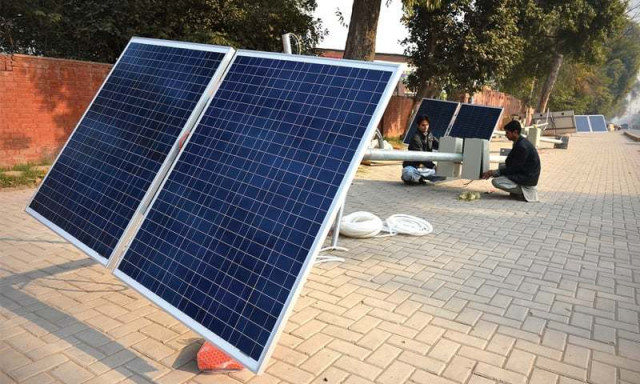Taking position: Tank batteries battle Peshawar’s energy crisis
Superior quality lithium-ion batteries seen attached to solar panels

Solar streetlights being installed at Peshawar Cantt.—White Star file photo
With their tour of duty in Afghanistan now over, ‘tank batteries’ are now being deployed on another front; battling prolonged electricity outages in Peshawar as people look for means to power alternative energy sources.
As summer approaches, an increasing number of these dry lithium-ion batteries are seen connected to uninterruptable power supply (UPS) devices and solar panels across the city. Like UPS devices and solar panels, the sale of such batteries has seen a boost in the Kalabari Bazaar of Peshawar Saddar and Karkhano Market. They come from Afghanistan in containers via Torkham Border. Customers and vendors alike say these batteries are taken from the military vehicles of Nato and Afghan forces in Afghanistan. Some say these are from tanks; others stipulate these are taken from Humvees.
Bright ideas
The devices have not gained popularity because of their past association with tanks, but more due to the fact that they perform brilliantly compared to the more conventional acid batteries when connected to the power source.
“My friend bought a tank battery from Karkhano Market for his home and it runs for a full 13 hours,” said Mohammad Ibrahim, a graphic designer at Khyber Bazaar. The professional himself has had a battery smuggled from across the border to power the computer and printer at his shop.
“Like other military gadgets openly sold in Sitara Market, these batteries are also smuggled from Afghanistan,” says Ibrahim who recommends other graphic designers follow his lead. “They are better than the [lead-acid] batteries we have been using,” he adds.
Light ideas
“It is a one-time investment which will bring fruitful results for at least four years,” says Mohammad Salman, who has been running an electronics shop for the past twenty years in Kala Bari Bazaar of Saddar.

“These are simple dry batteries, but are famous for powering military vehicles used by Nato forces,” he says. The businessman adds that once they are disposed of, a number of the batteries are transported to Khyber Market, United Market and Madina Market in Karkhano.
According to Salman, these batteries hit the market around two years ago and were immediately preferred by people to pair with solar panels. The price difference is around Rs10,000, he says. A 200 ampere acid-lead battery costs around Rs17,000 while a tank battery with the same output is about Rs27,000.
Most of the lithium-ion batteries come to the market from Karachi and Lahore; the superior quality ‘tank’ variety smuggled in from Afghanistan are more difficult to come across. “Sometimes, only a few pieces reach the market. This year I got seven which were sold out within days,” says Shaukat Ali, an electronics dealer at United Market in Karkhano.
He says batteries are largely bought by people in villages to use with solar panels. “The only problem is they are heavy both in terms of price and weight; otherwise they are great to power alternative energy sources,” Ali adds.
The sale of solar panels, dry batteries, UPS devices and solar lamps has doubled over the past two years due to the crippling energy crisis.
Published in The Express Tribune, April 6th, 2015.













COMMENTS
Comments are moderated and generally will be posted if they are on-topic and not abusive.
For more information, please see our Comments FAQ